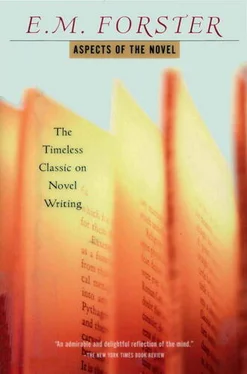Let us glance at two other examples of a shifting view-point.
The eminent French writer, André Gide, has published a novel called Les Faux Monnayeurs [4] Translated by Dorothy Bussy as The Counterfeiters, Knopf.
—for all its modernity, this novel of Gide's has one aspect in common with Bleak House: it is all to pieces logically. Sometimes the author is omniscient: he explains everything, he stands back, "il juge ses personnages"; at other times his omniscience is partial; yet again he is dramatic, and causes the story to be told through the diary of one of the characters. There is the same absence of view-point, but whereas in Dickens it was instinctive, in Gide it is sophisticated; he expatiates too much about the jolts. The novelist who betrays too much interest in his own method can never be more than interesting; he has given up the creation of character and summoned us to help analyse his own mind, and a heavy drop in the emotional thermometer results. Les Faux Monnayeurs is among the more interesting of recent works: not among the vital: and greatly as we shall have to admire it as a fabric we cannot praise it unrestrictedly now.
For our second example we must again glance at War and Peace. Here the result is vital: we are bounced up and down Russia—omniscient, semi-omniscient, dramatized here or there as the moment dictates—and at the end we have accepted it all. Mr. Lubbock does not, it is true: great as he finds the book, he would find it greater if it had a viewpoint; he feels Tolstoy has not pulled his full weight. I feel that the rules of the game of writing are not like this. A novelist can shift his view-point if it comes off, and it came off with Dickens and Tolstoy. Indeed this power to expand and contract perception (of which the shifting view-point is a symptom), this right to intermittent knowledge:—I find it one of the great advantages of the novel-form, and it has a parallel in our perception of life. We are stupider at some times than others; we can enter into people's minds occasionally but not always, because our own minds get tired; and this intermittence lends in the long run variety and colour to the experiences we receive. A quantity of novelists, English novelists especially, have behaved like this to the people in their books: played fast and loose with them, and I cannot see why they should be censured.
They must be censured if we catch them at it at the time. That is quite true, and out of it arises another question: may the writer take the reader into his confidence about his characters? Answer has already been indicated: better not. It is dangerous, it generally leads to a drop in the temperature, to intellectual and emotional laxity, and worse still to facetiousness, and to a friendly invitation to see how the figures hook up behind. "Doesn't A look nice— she always was my favourite." "Let's think of why B does that—perhaps there's more in him than meets the eye—yes, see—he has a heart of gold—having given you this peep at it I'll pop it back—I don't think he's noticed." "And C—he always was the mystery man." Intimacy is gained but at the expense of illusion and nobility. It is like standing a man a drink so that he may not criticize your opinions. With all respect to Fielding and Thackeray it is devastating, it is bar-parlour chattiness, and nothing has been more harmful to the novels of the past. To take your reader into your confidence about the universe is a different thing. It is not dangerous for a novelist to draw back from his characters, as Hardy and Conrad do, and to generalize about the conditions under which he thinks life is carried on. It is confidences about the individual people that do harm, and beckon the reader away from the people to an examination of the novelist's mind. Not much is ever found in it at such a moment, for it is never in the creative state: the mere process of saying, "Come along, let's have a chat," has cooled it down.
Our comments on human beings must now come to an end. They may take fuller shape when we come to discuss the plot.
"CHARACTER," says Aristotle, "gives us qualities, but it is in actions—what we do—that we are happy 01 the reverse." We have already decided that Aristotle is wrong and now we must face the consequences of disagreeing with him, "All human happiness and misery," says Aristotle, "take the form of action." We know better. We believe that happiness and misery exist in the secret life, which each of us leads privately and to which (in his characters) the novelist has access. And by the secret life we mean the life for which there is no external evidence, not, as is vulgarly supposed, that which is revealed by a chance word or a sigh. A chance word or sigh are just as much evidence as a speech or a murder: the life they reveal ceases to be secret and enters the realm of action.
There is, however, no occasion to be hard on Aristotle. He had read few novels and no modern ones—the Odyssey but not Ulysses —he was by temperament apathetic to secrecy, and indeed regarded the human mind as a sort of tub from which everything can finally be extracted; and when he wrote the words quoted above he had in view the drama, where no doubt they hold true. In the drama all human happiness and misery does and must take the form of action. Otherwise its existence remains unknown, and this is the great difference between the drama and the novel.
The speciality of the novel is that the writer can talk about his characters as well as through them or can arrange for us to listen when they talk to themselves. He has access to self-communings, and from that level he can descend even deeper and peer into the subconscious. A man does not talk to himself quite truly—not even to himself; the happiness or misery that he secretly feels proceeds from causes that he cannot quite explain, because as soon as he raises them to the level of the explicable they lose their native quality. The novelist has a real pull here. He can show the subconscious short-circuiting straight into action (the dramatist can do this too); he can also show it in its relation to soliloquy. He commands all the secret life, and he must not be robbed of this privilege. "How did the writer know that?" it is sometimes said. "What's his standpoint? He is not being consistent, he's shifting his point of view from the limited to the omniscient, and now he's edging back again." Questions like these have too much the atmosphere of the law courts about them. All that matters to the reader is whether the shifting of attitude and the secret life are convincing, whether it is πιθανόν in fact, and with his favourite word ringing in his ears Aristotle may retire.
However, he leaves us in some confusion, for what, with this enlargement of human nature, is going to become of the plot? In most literary works there are two elements: human individuals, whom we have recently discussed, and the element vaguely called art. Art we have also dallied with, but with a very low form of it: the story: the chopped-off length of the tapeworm of time. Now we arrive at a much higher aspect: the plot, and the plot, instead of finding human beings more or less cut to its requirements, as they are in the drama, finds them enormous, shadowy and intractable, and three-quarters hidden like an iceberg. In vain it points out to these unwieldy creatures the advantages of the triple process of complication, crisis, and solution so persuasively expounded by Aristotle. A few of them rise and comply, and a novel which ought to have been a play is the result. But there is no general response. They want to sit apart and brood or something, and the plot (whom I here visualize as a sort of higher government official) is concerned at their lack of public spirit: "This will not do," it seems to say. "Individualism is a most valuable quality; indeed my own position depends upon individuals; I have always admitted as much freely. Nevertheless there are certain limits, and those limits are being overstepped. Characters must not brood too long, they must not waste time running up and down ladders in their own insides, they must contribute, or higher interests will be jeopardised." How well one knows that phrase, "a contribution to the plot"! It is accorded, and of necessity, by the people in a drama: how necessary is it in a novel?
Читать дальше












